Ply as it might the lonely roads of nether Australia, David Michod's The Rover confines itself to a very small emotional map. So too that grim fellow in the short pants and dress shirt, both long absent from the wash, hell bent to recover his car. All the more impressive that The Rover so involves us in its story, it's anti-hero's almost inexplicable quest, wrings so much emotion out of such a narrow range, like water divined from that arid Australian ground.
The Rover is the second feature written and directed by David Michod. He apparently conceived the story with actor and writer Joel Edgerton, one of the many veterans of Michod's first film, Animal Kingdom, who contribute to The Rover.
Michod's brief directorial career has also proven an exercise in drawing a lot of action and emotion out of limited thematic ground. Though ostensibly more mobile and more minimal than its predecessor, The Rover echoes Animal Kingdom in violence and relative lawlessness and its considerations of family, specifically a kind of innocent groping after some sense of belonging. What has most distinguished David Michod's first two feature films are their integrity of story and character. Mr. Michod has made two very uncompromising films.

The Rover's story is basic enough, even while some of the specifics of plot and backstory of its two main characters are only hinted at in asides, mumbled bits of dialog, or parceled out in brief allusion. Our rover is presumably Eric (Guy Pearce), sitting in his car as the film begins, looking out on a barren landscape, seemingly seeing even less life than is actually present. We have been told that the time is 10 years after "the collapse," apparently a world economic free fall even more comprehensive than its havoc-wreaking 2008 predecessor. The life of this desolate, wandering man intersects with a group of criminals who have just perpetrated some sort of caper gone wrong. Like most all action in The Rover, this intersection is a sudden and violent departure from a near-static scene. As Eric sits in a kind of canteen at the end of the world drinking a glass of water, the truck with the criminals flies silently by the window behind him on its side, the vehicle having flipped out of control after a squabble breaks out among its motley group of passengers. When they cannot extricate the truck from the roadside where it came to rest, one of the men hot wires Eric's car and they speed away. This turns out to be the worst decision the criminals make in a day chock full of them.
 English-born and Australian-raised Guy Pearce tends to make any film worthwhile, a traveling companion that enlivens even otherwise pointless journeys. When material and execution are equal to his chameleonic abilities, then we really have something. Such is the case with The Rover. There's nothing pretty about Pearce (consider the sort of elegant figure he cut in L.A. Confidential and as the future Edward VIII in The King's Speech) or The Rover, but its hard to take your eyes of either.
English-born and Australian-raised Guy Pearce tends to make any film worthwhile, a traveling companion that enlivens even otherwise pointless journeys. When material and execution are equal to his chameleonic abilities, then we really have something. Such is the case with The Rover. There's nothing pretty about Pearce (consider the sort of elegant figure he cut in L.A. Confidential and as the future Edward VIII in The King's Speech) or The Rover, but its hard to take your eyes of either.
One can only imagine how Eric and most other inhabitants of this post-collapse Australia might smell. Pearce's hair looks to have been trimmed with garden shears down to an Outback-practical shortness and prominent recession. The rough growth of salt and pepper beard adds to cheeks and jaw which seem puffed, as if all the man's misery has drifted downward along the face, seeped from the troubled mind to settle around the mouth. The spring, or perhaps cauldron of this misery is in the eyes above. Dark, nearly black, Eric seems to be forging them to lifeless coal with the intensity of his fury.
An initial chase between the Rover and the men who stole his car sets the tenor of the story, demonstrates the tenacity of the man. He quickly frees their truck and gives pursuit, coming abreast his car until one of the men pulls a gun. He drops back but continues to follow. This almost absurd chase is all the more menacing in its relentless, inexorable start and stop. Finally both vehicles do come to rest. The group confronts the solitary man and he eventually throttles one of the trio against the trunk of his car as if none of the other men or their guns are present to stop him. He catches a rifle butt to the back of the head and wakes up at the side of the road some time later. Of course, this does not deter our anti-hero in the least.
Even as a showdown between Eric and the men who stole his car is inevitable, even while he and the young man left behind do ultimately attach themselves like two burned sections of skin reluctant to take a graft, things do occur on the road that are anything but predictable.
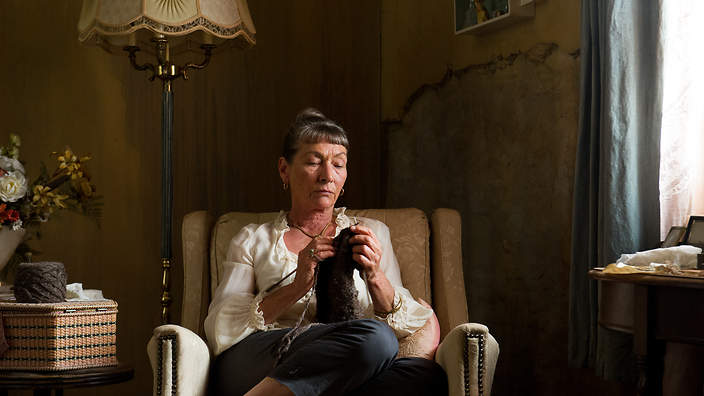 Most strangely, before he meets Rey, there is a near-Lynchian digression in which Eric first wanders into a home to ask if anyone has seen his stolen car. This turns into a veritable odyssey that begins with a young man answering the Rover's questions while several others sprawl around them in a living room asleep. It ends with Eric attempting to buy a gun, a transaction that goes very poorly for the seller. In between and after these encounters, there are two Chinese acrobats, a midget and a woman who sits placidly in white blouse miraculously untouched by the dust which pervades most everything else in this world, half oracle from The Matrix, half procuress, cooing "What's your name, honey." This extended scene is the weirdest example of how The Rover proceeds down it's crooked, if inexorable course: we're never sure what the next turn will reveal and where violence might flare up. And yet there seems a logic behind it all. Even before a rusty circus vehicle is seen outside the house, thus explaining the odd personages playing cards that Eric discovers in a kind of opium den, nothing or no one in the bizarre establishment seems so out of place as to stretch credibility to the breaking point. Such is the authority of the storytelling.
Most strangely, before he meets Rey, there is a near-Lynchian digression in which Eric first wanders into a home to ask if anyone has seen his stolen car. This turns into a veritable odyssey that begins with a young man answering the Rover's questions while several others sprawl around them in a living room asleep. It ends with Eric attempting to buy a gun, a transaction that goes very poorly for the seller. In between and after these encounters, there are two Chinese acrobats, a midget and a woman who sits placidly in white blouse miraculously untouched by the dust which pervades most everything else in this world, half oracle from The Matrix, half procuress, cooing "What's your name, honey." This extended scene is the weirdest example of how The Rover proceeds down it's crooked, if inexorable course: we're never sure what the next turn will reveal and where violence might flare up. And yet there seems a logic behind it all. Even before a rusty circus vehicle is seen outside the house, thus explaining the odd personages playing cards that Eric discovers in a kind of opium den, nothing or no one in the bizarre establishment seems so out of place as to stretch credibility to the breaking point. Such is the authority of the storytelling. It is at the doctor's remote compound that we also see the first sliver of sentiment betrayed by this desolate man. Like many scenes in Animal Kingdom, there is a tense winding through place and time with an almost palpable sense of menace at every turn. Eric is drawn through a passageway and into a room where we don't know what awaits him in the darkness. When a florescent light flickers into harsh illumination, it's not some frightening adversary, but cage upon cage of stray dogs that the doctor has taken in. When the woman joins Eric, she's surprised at the interest he has taken in the ragged creatures.
When we ultimately find out why the man has been so determined to recover his car - "You must really love that car," the otherworldly madam murmurs to him during their strange encounter - the earlier scene in which he regards the abandoned dogs gains a greater resonance, a powerful echo. So too his relationship with Eric
One brief action eloquently and efficiently illustrates the relationship that develops between Eric and the young man who had come to Australia, like his brother, to find mining work after the economic collapse. Rey's wound becomes infected. Eric helps him reapply a bandage after first disinfecting the wound with gasoline and drying it with a rag. Rey responds to these rough ministrations as some scruffy, ill-used dog who has been scratched behind the ears. So starved for affection is the young man that as gasoline is poured on his afflicted torso and mopped with a dirty piece of cloth, he responds with a brief, contented near-smile. The eyes nearly roll beneath his dark, thick, undulant eyebrows.
Beneath and behind those redoubtable eyebrows is Robert Pattinson. The much-swooned-after star of those Twilight films apparently auditioned for the role of Rey, beating out several rivals. Neither that willingness to audition nor his work in The Rover bespeak any young movie star vanity. It's a performance that's a little mannered, a little blinking, swaying slightly toward a kind of Son of Sling Blade under duress. But mainly Pattinson gets this simple young man across, gaining credibility as the film progresses. Rey even blossoms slightly, becomes freer with his speech as the bond with Eric strengthens along the road. Pattison's work here stands on its own, relative to the rest of his brief career and holding its own for the most part against the power of Guy Pearce. But watch Pattinson in David Cronenberg's Cosmopolis (possibly the thinking person's Wolf of Wall Street), the quick intelligence required of him throughout that film. You begin to have a sense of his range and promise.
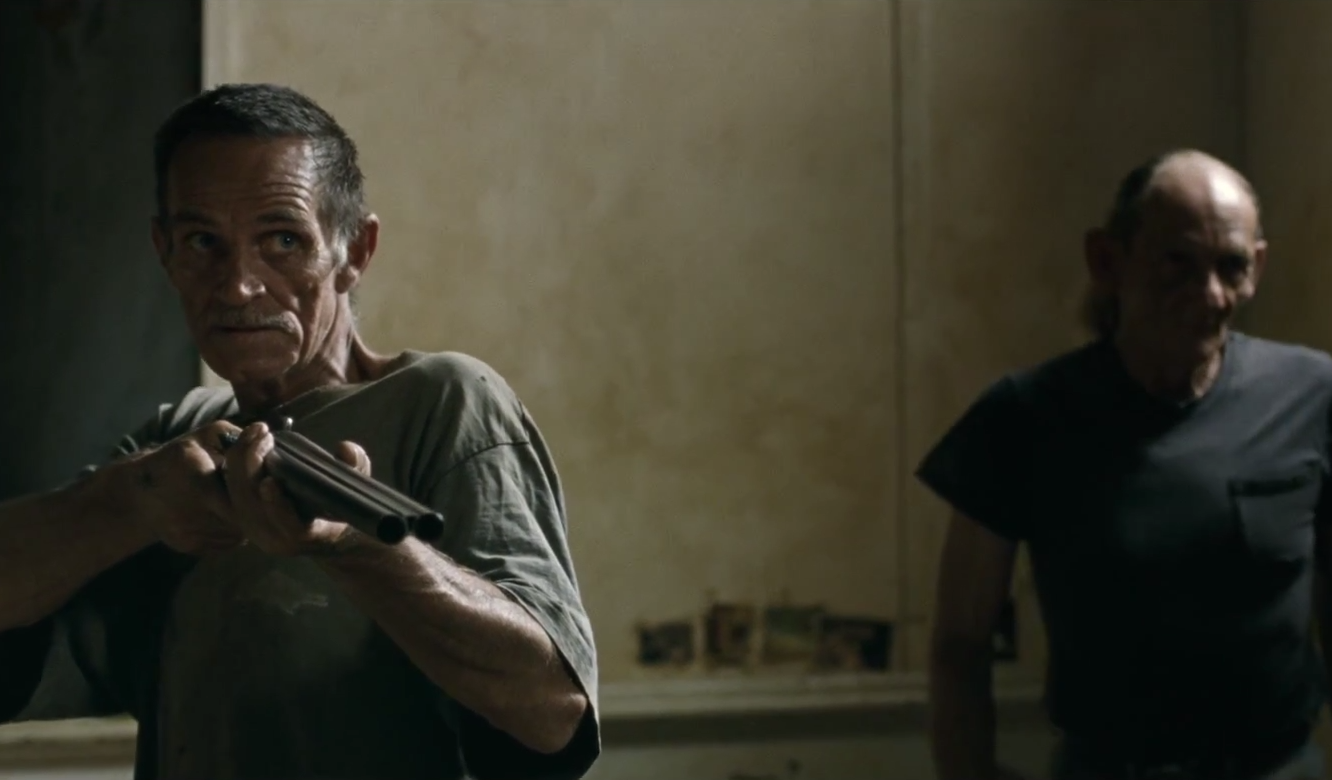 Antony Partos composed the varied score for The Rover, as he did for Animal Kingdom. Here it ranges from the percussive to the wailing early on. At times, a piano drifts in as if from another dimension, a splintered sonata. Later a keyboard is heard like one submerged in water, giving way eventually to wavering spiritual. All of this no mere discord, cacophony for effect; this is not John Cage having a bad day. But signaling and reflecting the action of the film, themes emerge, however spare, however sad. As the Rover and Rey grow closer, a kind of tenuous harmony is introduced.
Antony Partos composed the varied score for The Rover, as he did for Animal Kingdom. Here it ranges from the percussive to the wailing early on. At times, a piano drifts in as if from another dimension, a splintered sonata. Later a keyboard is heard like one submerged in water, giving way eventually to wavering spiritual. All of this no mere discord, cacophony for effect; this is not John Cage having a bad day. But signaling and reflecting the action of the film, themes emerge, however spare, however sad. As the Rover and Rey grow closer, a kind of tenuous harmony is introduced. The story, like the music of The Rover is a spare, sometimes very rough surface from which any expression of humor - "I've got things in tins...buy something!" admonishes one exasperated shop keeper with his rifle - or tenderness emerges in all the more stark relief from the emotional landscape about it. Much the same can be said for the work of Guy Pearce. In lesser hands, his would be an interminable, one-note performance. With Pearce, that often unvarying tone hints at and ultimately reveals the holding back of an awful flood. When his eyes well at the film's climax, the brief expression is a kind of deluge.
Even with Eric's rare show of emotion and the film's final, sad revelation, there is not catharsis so much as weary resolution. So it's gone through David Michod's first two features. The logic is severe but the integrity offers a kind of exhilaration.
db
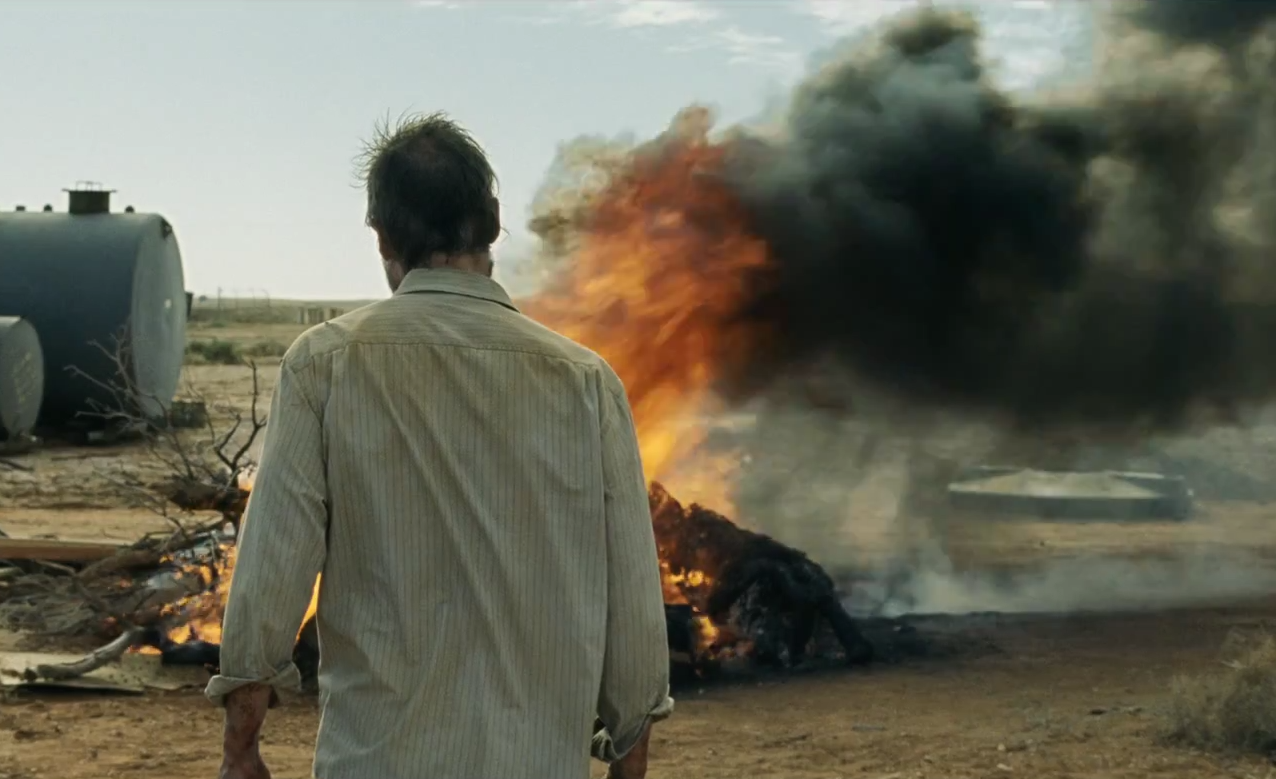
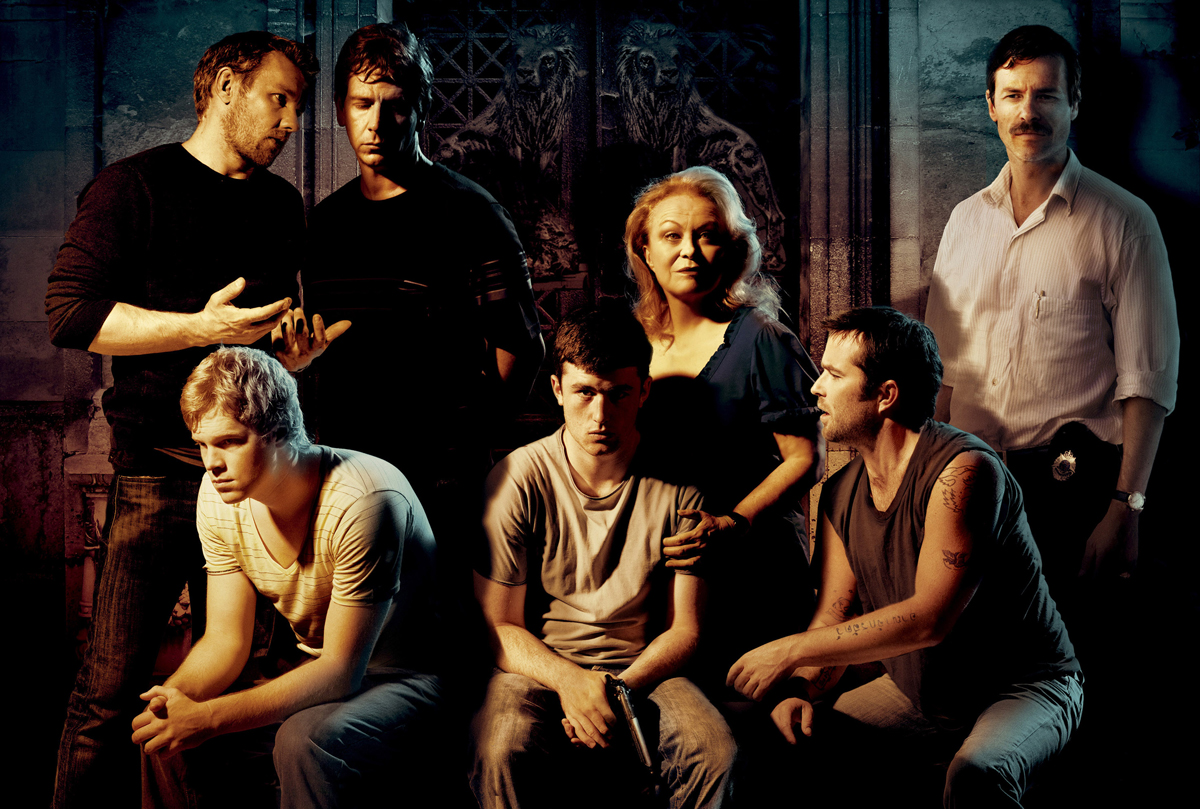

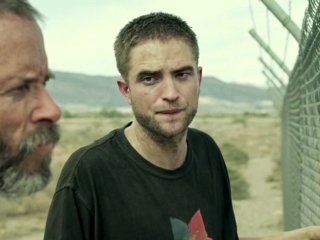

Comments
Post a Comment